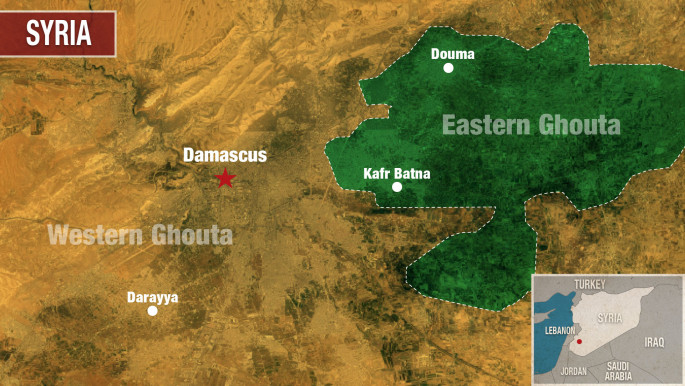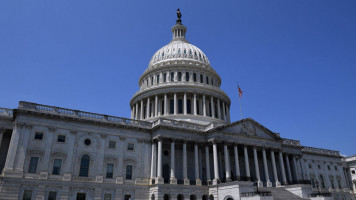'First they starve them, then they bomb them': Scores of children killed in Eastern Ghouta
Airstrikes hit Syria's Eastern Ghouta for a third straight day on Tuesday, bringing the civilian death toll to nearly 200 as the UN warned the situation in the rebel enclave was spinning "out of control".
Regime strikes and rocket and artillery fire have battered the rebel-held enclave since Sunday in apparent preparation for a government ground assault on the besieged region.
At least 194 civilians have been killed, among them 57 children, the Syrian Observatory for Human Rights said.
On Monday alone, 127 civilians, including 39 children, were killed in the bombardment - the single bloodiest day for Eastern Ghouta in four years.
Fresh airstrikes on Tuesday morning killed at least 50 civilians, including 13 children, the Britain-based war monitor said.
Held by rebels since 2012, Eastern Ghouta is the last opposition pocket around Damascus and President Bashar al-Assad is keen to retake it with an apparently imminent ground assault.
Parents desperately searched for their children in hospitals and morgues. Eastern Ghouta's Douma hospital was full of distraught civilians: one father slapped his forehead after finding his two dead children, another erupted into tears as he discovered the body of his newborn on a purple sheet next to a pool of blood.
Lost and wounded children also cried for their parents, others sat silently, rivulets of blood running down their faces whitened by dust from the strikes, as they received treatment.
— The White Helmets (@SyriaCivilDef) February 19, 2018
|
As a barrage of airstrikes, rocket fire and artillery pummelled several towns across Eastern Ghouta, the United Nations warned that the targeting of civilians in Eastern Ghouta "must stop now".
"It's imperative to end this senseless human suffering," Panos Moumtzis, the UN's Regional Humanitarian Coordinator for the Syria Crisis said.
A survey last November showed 11.9 percent of children under five were suffering acute malnutrition in Eastern Ghouta, "the highest rate ever recorded in Syria" since the conflict started.
A UN World Food Programme report also revealed that Syrians were eating rubbish, fainting from hunger and forcing their children to eat on alternate days because of the food shortage in the area.
The report found that nearly 174,500 people trapped in the town of Douma since September 2017 have been forced to adopt emergency "coping strategies".
 |
|
These coping strategies include consuming expired food, animal fodder and refuse, going days without eating and begging and engaging in high risk activities to get food. There have been numerous reports of hunger-induced fainting episodes among school children and teachers.
Dozens of civilians have also been killed by the Syrian government's use of internationally banned cluster munitions in the rebel-held suburb.
The Syrian conflict began when the Baath regime, in power since 1963 and led by Assad, responded with military force to peaceful protests demanding democratic reforms during the Arab Spring wave of uprisings, triggering an armed rebellion fuelled by mass defections from the Syrian army.
The brutal tactics pursued mainly by the regime, which have included the use of chemical weapons, sieges, mass executions and torture against civilians have led to war crimes investigations.

![Palestinians mourned the victims of an Israeli strike on Deir al-Balah [Getty]](/sites/default/files/styles/image_684x385/public/2024-11/GettyImages-2182362043.jpg?h=199d8c1f&itok=xSHZFbmc)


![The law could be enforced against teachers without prior notice [Getty]](/sites/default/files/styles/image_684x385/public/2178740715.jpeg?h=a5f2f23a&itok=hnqrCS4x)
 Follow the Middle East's top stories in English at The New Arab on Google News
Follow the Middle East's top stories in English at The New Arab on Google News


